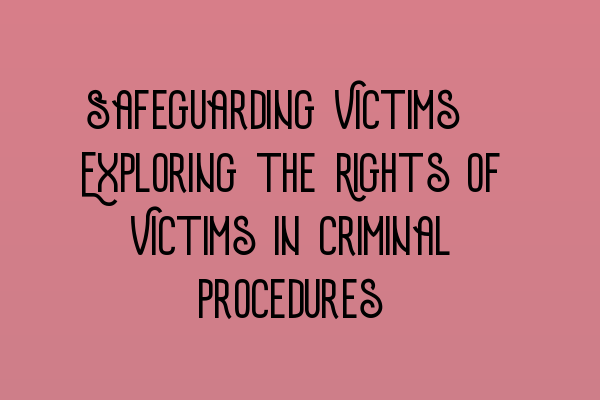Safeguarding Victims: Exploring the Rights of Victims in Criminal Procedures
Introduction:
In recent years, there has been a growing recognition of the rights and needs of victims within the criminal justice system. As a solicitor, it is my duty to ensure that victims are safeguarded, treated with respect, and provided with the support they require throughout the criminal proceedings. In this blog post, we will delve into the crucial topic of safeguarding victims and explore the rights that should be afforded to them.
1. Understanding Victims’ Rights:
When a crime occurs, it is not just the offender who suffers; the victim also bears the psychological, emotional, and sometimes physical consequences. To ensure that victims are not left feeling forgotten or marginalized, numerous legislation and policies have been put in place to protect and support them.
2. The Right to Be Informed:
One of the most fundamental rights of victims is the right to be informed about the progress of their case. This includes being notified about any significant developments, such as the arrest of a suspect, bail hearings, court dates, and the outcome of the trial. By keeping victims informed, we empower them to participate fully in the legal process.
3. The Right to Protection:
Victims have the right to feel safe and protected both during and after criminal proceedings. This may involve measures such as restraining orders, anonymity, or even support with relocating if necessary. Ensuring the safety of victims is paramount in enabling them to provide their testimony without fear.
4. The Right to Support:
Emotional and practical support is essential for victims to cope with the aftermath of a crime. Victim Support Services play a crucial role in offering counseling, advice, and practical assistance, including helping victims access compensation and navigate the legal system. The right to support is vital in assisting victims on their journey towards healing and recovery.
5. The Right to Participate:
Victims should have the opportunity to actively participate in criminal proceedings, should they wish to do so. This can include providing a victim impact statement, which allows individuals to express how the crime has affected them personally, as well as their needs and wishes. Empowering victims to have a say in court proceedings can be a cathartic and empowering experience.
6. The Right to Restitution:
Victims have the right to seek financial restitution for the harm and loss they have suffered. This could include compensation for medical expenses, psychological therapy, loss of earnings, or damage to property. Providing victims with the means to recover their losses not only helps them rebuild their lives but also sends a strong message that their rights are valued.
7. Supporting Vulnerable Victims:
Certain victims may be particularly vulnerable, such as children, the elderly, or victims of domestic violence. It is important to address their additional needs and ensure their voices are heard. This may entail special measures within criminal proceedings to facilitate their participation, ensuring their understanding and reducing any potential retraumatization.
Conclusion:
Safeguarding victims within criminal procedures is more than just a legal obligation; it is a moral imperative. By recognizing and respecting the rights of victims, we can foster a criminal justice system that is fair, inclusive, and supportive. As a solicitor, it is my mission to advocate for the rights of victims and ensure that their voices are heard. Together, let us continue to work towards a future where victims are safeguarded and justice is served.
If you or someone you know has been a victim of a crime, do not hesitate to reach out to SQE Criminal Law & Practice. Our team of dedicated legal professionals is well-versed in safeguarding the rights of victims and ensuring their voices are heard.
